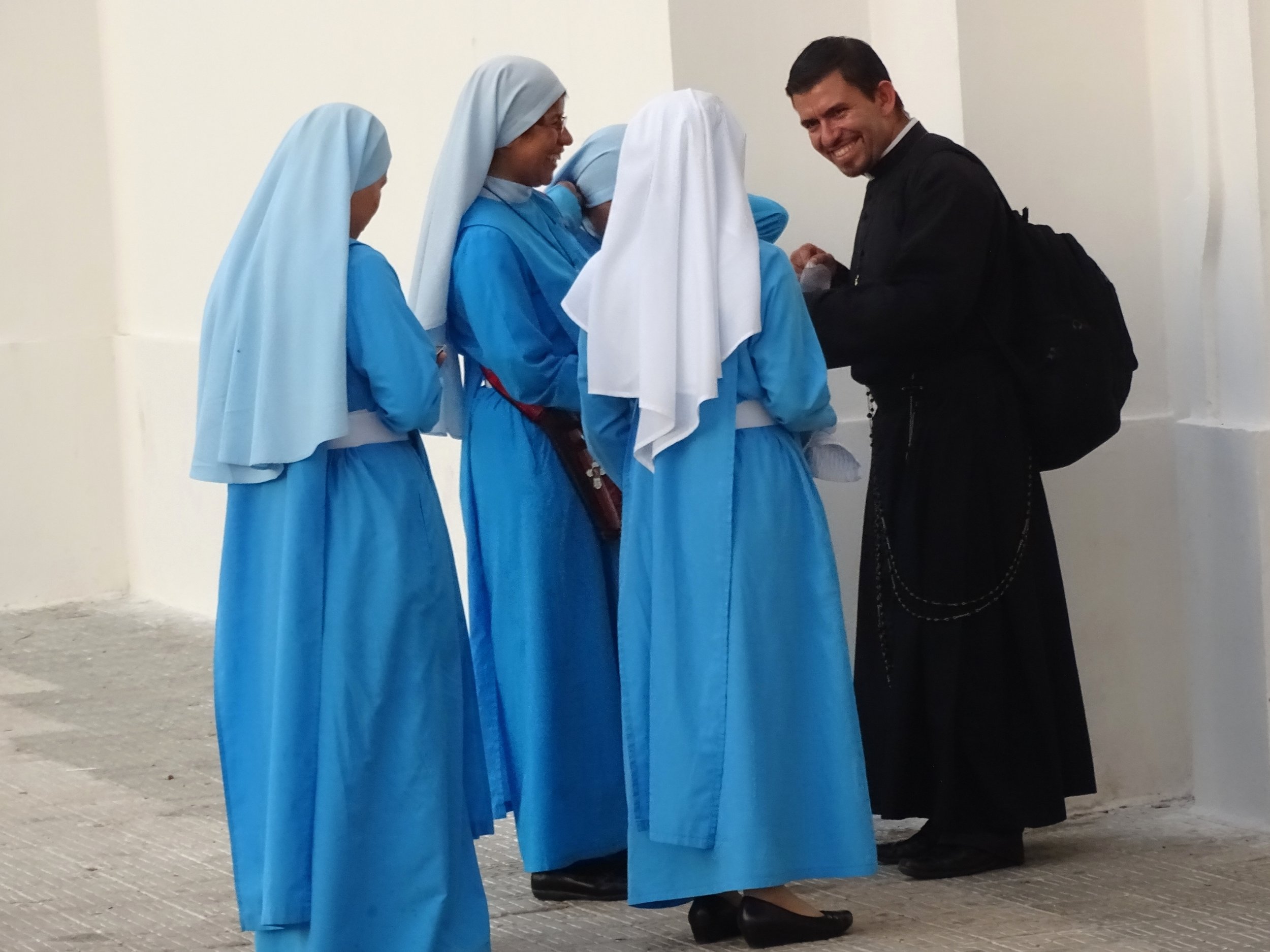Nicaraguan Government Expels Arbitrarily Detained Priests
A priest and nuns gather on the steps of a Nicaraguan cathedral. (Photo by Adam Jones)
(ANALYSIS) Recent months (and years) have seen a crackdown by the Nicaraguan government against religious leaders and religious institutions in the country.
Among others, President Daniel Ortega is reported to have “ordered the arrest of, forced into exile, and verbally attacked priests and bishops, labeled them ‘criminals’ and ‘coup-plotters,’ and accused them of inciting violence.”
Because of the attacks, in August 2022, the Inter-American Commission on Human Rights condemned the “escalating repression against members of the Roman Catholic Church in Nicaragua.” IACHR classified the acts as “systematic persecution, criminalization, harassment, police hounding, stigmatizing comments by State authorities, and, more generally, acts of repression targeting members of the Roman Catholic
Church in Nicaragua, due to its mediation efforts in the national talks of 2018 and its critical position to denounce human rights violations committed in the context of Nicaragua’s ongoing crisis.” For example, 2022 has also seen shutdowns and confiscations of assets belonging to several organizations linked to the Roman Catholic Church, including the Catholic University of Dry Tropic Farming and Livestock, several schools in the Estelí diocese, and St. Teresa of Calcutta’s Missionaries of Charity, whose members were expelled from Nicaragua.
This repression continued into 2023. Around Christmas 2023, the government arbitrarily arrested and detained clergymen including Father Silvio Fonseca, who has openly criticized the Nicaraguan government’s intense persecution of the Catholic Church, and Bishop Isidro Mora and Father Pablo Villafranca, each of whom offered prayers for the wrongfully imprisoned Bishop Rolando Álvarez prior to their arrests.
Furthermore, on Dec. 24, 2023 (Christmas Eve), the government sentenced six former employees of the Catholic charity Caritas, Julio Sevilla, Julio Berríos, Bladimir Pallés, María Verónica Herrera Galeano, Freydell Andino, and Mariví Andino, to six years imprisonment on dubious money laundering charges. This follows several other attacks against religious leaders over the months, including the sentencing of Bishop Rolando Álvarez to 26 years imprisonment, expelling religious prisoners of conscience to the United States and the Vatican, and shuttering Catholic charitable and educational institutions such as the Jesuit-run University of Central America.
Bishop Rolando Álvarez was ordered to remain under house arrest on charges of “conspiracy” and “spreading false news.” He was also accused of “damaging the Nicaraguan government and society” after he criticized the government for its closure of several Catholic radio stations and human rights abuses more broadly.
He was later sentenced to 26 years in prison after he declined to be exiled to the United States and has been reportedly convicted of several charges, including treason, undermining national integrity and spreading false news. Reportedly, he was also fined and stripped of his citizenship.
On Jan. 4, 2024, the United States Commission on International Religious Freedom issued a statement strongly condemning the Nicaraguan government.
USCIRF Vice Chair Frederick A. Davie said that “USCIRF is outraged that the Nicaraguan government has chosen to continue its brutal crackdown on members of the Catholic Church for speaking out about the religious freedom and human rights violations occurring in the country. It has become increasingly clear that President Daniel Ortega and Vice President Rosario Murillo are intent on silencing the voice of any individual peacefully following the dictates of their conscience.”
USCIRF Commissioner Frank Wolf added: “We urge the U.S. Congress to help stem these egregious eligious freedom violations and hold violators accountable by passing the bipartisan Restoring Sovereignty and Human Rights in Nicaragua Act of 2023. This bill expands the U.S. government’s ability to sanction officials responsible for religious freedom and human rights violations and ensures the U.S. government’s support for the United Nations Group of Human Rights Experts on Nicaragua, which is working diligently to investigate all alleged human rights violations and abuses committed in the country since 2018.”
This piece was republished from Forbes with permission.
Dr. Ewelina U. Ochab is a human rights advocate, author and co-founder of the Coalition for Genocide Response. She’s authored the book “Never Again: Legal Responses to a Broken Promise in the Middle East” and more than 30 UN reports. She works on the topic of genocide and persecution of ethnic and religious minorities around the world. She is on Twitter @EwelinaUO.

